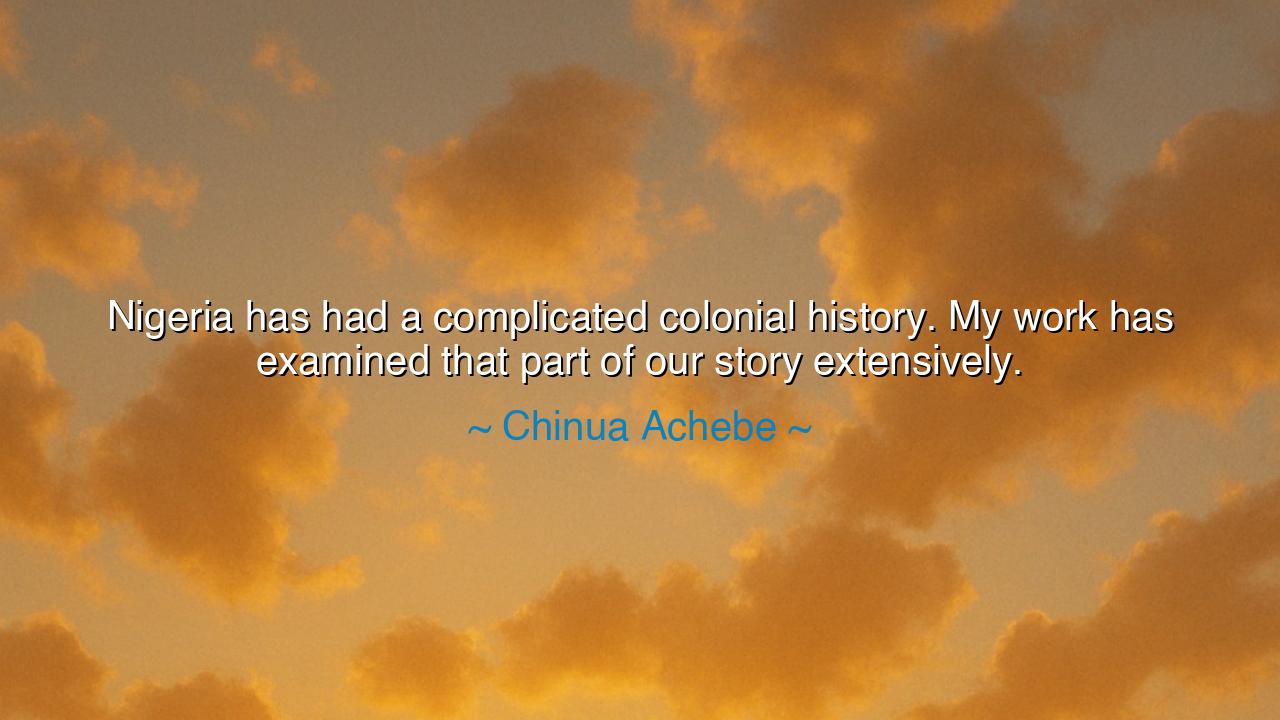
Nigeria has had a complicated colonial history. My work has
Nigeria has had a complicated colonial history. My work has examined that part of our story extensively.






Hearken, O children of the earth, and lend your hearts to the words of Chinua Achebe, the chronicler of his people, who proclaimed with solemnity and insight: “Nigeria has had a complicated colonial history. My work has examined that part of our story extensively.” In these words lies a meditation upon the burdens and legacies of conquest, the resilience of a people, and the sacred duty of the storyteller to record and illuminate the truths of history. Achebe reminds us that understanding one’s past is not merely an act of memory, but an act of moral and cultural responsibility.
Nigeria, like many lands, bore the weight of colonial dominion, its people subjected to foreign laws, foreign languages, and foreign rulers. The history of conquest, exploitation, and cultural imposition left scars upon the land and the spirit of its inhabitants. Achebe’s work sought to uncover and examine these truths, to reveal both the suffering endured and the resilience displayed, so that future generations could understand not only the oppression they faced but also the strength and ingenuity with which their ancestors resisted and survived.
Consider the period of British colonial rule in Nigeria. The imposition of indirect rule, the extraction of resources, and the restructuring of traditional societies created a complex tapestry of disruption and adaptation. Villages were reorganized under foreign administration, local authorities were co-opted or undermined, and the fabric of cultural life was tested. Achebe, through his writings, especially in works like Things Fall Apart, captures the subtle and profound impacts of colonialism—not merely in events, but in the erosion of identity, the tensions between old and new, and the struggles of individuals to reconcile the forces that bore upon them.
Achebe’s insight is both historical and moral. By examining colonial history extensively, he seeks to teach the lessons of the past, revealing how external domination can fracture societies, distort values, and ignite conflicts whose echoes persist for generations. His work is a testament to the necessity of understanding history, not as a distant tale, but as a living guide that shapes contemporary thought, social cohesion, and the ongoing quest for justice and self-determination.
Consider the Amalgamation of 1914, when the Northern and Southern Protectorates were merged into one Nigeria under British administration. This act, undertaken without regard for the deep cultural, linguistic, and religious differences among the peoples of the land, sowed seeds of tension and conflict. Achebe’s writings illuminate how such historical decisions reverberate through time, shaping politics, identity, and society. To study colonial history, therefore, is to confront the complexity of causality, to understand how the past informs present challenges and opportunities.
The lesson embedded in Achebe’s words is profound: to understand oneself and one’s society, one must confront the full scope of history, including its painful chapters. Ignorance or denial of the past risks repeating the errors of those who came before. By studying colonial history, by telling the stories of subjugation, adaptation, and resistance, we cultivate wisdom, resilience, and insight. We honor the struggles of ancestors and equip ourselves to navigate the challenges of the present with understanding and foresight.
From this insight flows practical guidance: read history with care, listen to the stories of elders, and reflect upon the forces that shaped your community and nation. Preserve memory not as mere recollection, but as a tool for moral and cultural education. In examining the complexities of the past, like Achebe, one cultivates empathy, discernment, and a vision for a future built upon awareness rather than ignorance. History is both teacher and mirror, revealing the patterns of triumph and tragedy that shape human destiny.
Thus, remember: Nigeria’s colonial history is complicated, yet it is in its examination that understanding and empowerment are found. Chinua Achebe’s work reminds us that knowledge of the past is not an indulgence—it is a necessity. By grappling with history, acknowledging injustices, and learning from the endurance and wisdom of those who lived through them, we prepare ourselves to act with insight, courage, and integrity in the world we inherit.
If you wish, I can also craft a more dramatic, audio-ready version, vividly illustrating the impacts of British colonialism in Nigeria and Achebe’s literary efforts, making his message emotionally resonant for listeners. Do you want me to do that next?






AAdministratorAdministrator
Welcome, honored guests. Please leave a comment, we will respond soon